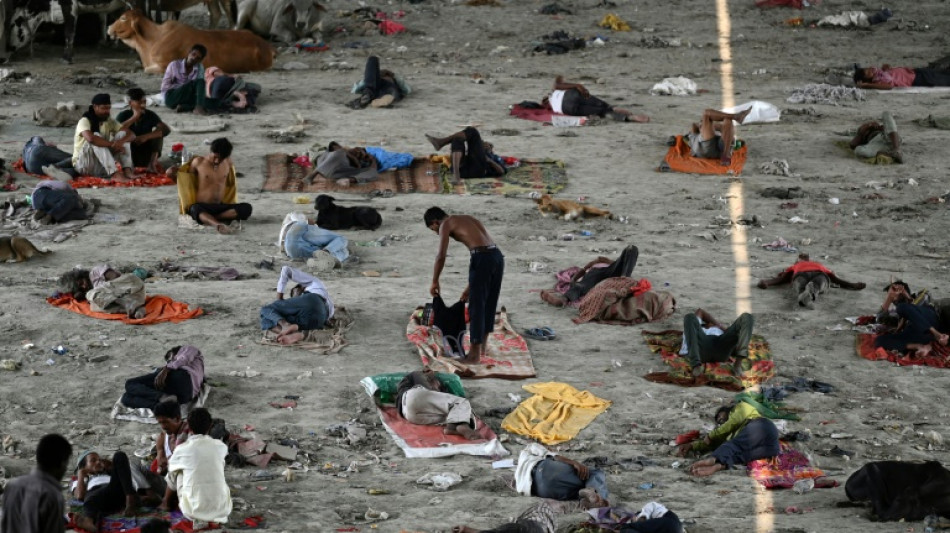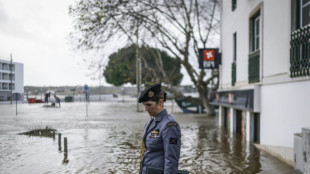
-
 German exports to US plunge as tariffs exact heavy cost
German exports to US plunge as tariffs exact heavy cost
-
Portugal heads for presidential vote, fretting over storms and far-right

-
 Suicide blast at Islamabad mosque kills at least 30, wounds over 130: police
Suicide blast at Islamabad mosque kills at least 30, wounds over 130: police
-
Russia says Kyiv behind Moscow shooting of army general

-
 Greenland villagers focus on 'normal life' amid stress of US threat
Greenland villagers focus on 'normal life' amid stress of US threat
-
Iran, US hold talks in Oman after Trump military threats

-
 Stocks waver as tech worries build
Stocks waver as tech worries build
-
Dupont, Jalibert click to give France extra spark in Six Nations bid

-
 'Excited' Scots out to prove they deserve T20 World Cup call-up
'Excited' Scots out to prove they deserve T20 World Cup call-up
-
EU tells TikTok to change 'addictive' design

-
 India captain admits 'there will be nerves' at home T20 World Cup
India captain admits 'there will be nerves' at home T20 World Cup
-
Stellantis takes massive hit for 'overestimation' of EV shift

-
 'Mona's Eyes': how an obscure French art historian swept the globe
'Mona's Eyes': how an obscure French art historian swept the globe
-
Iran, US hold talks in Oman

-
 Iran, US hold talks in Oman after deadly protest crackdown
Iran, US hold talks in Oman after deadly protest crackdown
-
In Finland's forests, soldiers re-learn how to lay anti-personnel mines

-
 Israeli president visits Australia after Bondi Beach attack
Israeli president visits Australia after Bondi Beach attack
-
In Dakar fishing village, surfing entices girls back to school

-
 Lakers rally to beat Sixers despite Doncic injury
Lakers rally to beat Sixers despite Doncic injury
-
Russian pensioners turn to soup kitchen as war economy stutters

-
 Japan taps Meta to help search for abuse of Olympic athletes
Japan taps Meta to help search for abuse of Olympic athletes
-
As Estonia schools phase out Russian, many families struggle

-
 Toyota names new CEO, hikes profit forecasts
Toyota names new CEO, hikes profit forecasts
-
Next in Putin's sights? Estonia town stuck between two worlds

-
 Family of US news anchor's missing mother renews plea to kidnappers
Family of US news anchor's missing mother renews plea to kidnappers
-
Spin woes, injury and poor form dog Australia for T20 World Cup

-
 Japan's Liberal Democratic Party: an election bulldozer
Japan's Liberal Democratic Party: an election bulldozer
-
Hazlewood out of T20 World Cup in fresh blow to Australia

-
 Japan scouring social media 24 hours a day for abuse of Olympic athletes
Japan scouring social media 24 hours a day for abuse of Olympic athletes
-
Bangladesh Islamist leader seeks power in post-uprising vote

-
 Rams' Stafford named NFL's Most Valuable Player
Rams' Stafford named NFL's Most Valuable Player
-
Japan to restart world's biggest nuclear plant

-
 Japan's Sanae Takaichi: Iron Lady 2.0 hopes for election boost
Japan's Sanae Takaichi: Iron Lady 2.0 hopes for election boost
-
Italy set for 2026 Winter Olympics opening ceremony

-
 Hong Kong to sentence media mogul Jimmy Lai on Monday
Hong Kong to sentence media mogul Jimmy Lai on Monday
-
Pressure on Townsend as Scots face Italy in Six Nations

-
 Taiwan's political standoff stalls $40 bn defence plan
Taiwan's political standoff stalls $40 bn defence plan
-
Inter eyeing chance to put pressure on title rivals Milan

-
 Arbeloa's Real Madrid seeking consistency over magic
Arbeloa's Real Madrid seeking consistency over magic
-
Dortmund dare to dream as Bayern's title march falters

-
 PSG brace for tough run as 'strange' Marseille come to town
PSG brace for tough run as 'strange' Marseille come to town
-
Japan PM wins Trump backing ahead of snap election

-
 AI tools fabricate Epstein images 'in seconds,' study says
AI tools fabricate Epstein images 'in seconds,' study says
-
Asian markets extend global retreat as tech worries build

-
 Sells like teen spirit? Cobain's 'Nevermind' guitar up for sale
Sells like teen spirit? Cobain's 'Nevermind' guitar up for sale
-
Thailand votes after three prime ministers in two years

-
 UK royal finances in spotlight after Andrew's downfall
UK royal finances in spotlight after Andrew's downfall
-
Diplomatic shift and elections see Armenia battle Russian disinformation

-
 Undercover probe finds Australian pubs short-pouring beer
Undercover probe finds Australian pubs short-pouring beer
-
Epstein fallout triggers resignations, probes


Heat records topple across sweltering Asia
Temperature records are being toppled across Asia, from India's summer to Australia's winter, authorities said Friday, in fresh evidence of the impact of climate change.
The sweltering temperatures match longstanding warnings from climate scientists and come as countries from Greece to Canada battle record heat and deadly wildfires.
In India, the world's most populous country, officials said this August was the hottest and driest since national records began more than a century ago.
The month falls in the middle of India's annual monsoon, which usually brings up to 80 percent of the country's yearly rainfall.
But despite heavy downpours that caused deadly floods in the country's north earlier this month, overall rainfall has been far below average.
August saw an average of just 161.7 millimetres (6.4 inches), 30.1 mm lower than the previous August record in 2005, the India Meteorological Department (IMD) said.
That has left the country baking in unrelenting heat.
"The large rainfall deficiency and weak monsoon condition is the main reason," the IMD said.
Authorities in Japan also said Friday that the country had experienced its hottest summer since records began in 1898.
Temperatures from June to August were "considerably higher" than average across the north, east and west of the country, the weather agency said.
In many locations "not only maximum temperatures but also minimum temperatures" reached record highs, it added.
And in Australia this winter was the warmest on record, with an average temperature of 16.75 degrees Celsius (62.15 Fahrenheit) for the season running from June to August.
That is a hair above a record set in 1996, and the highest average winter temperature since the country's records began in 1910, the Bureau of Meteorology said.
- 'More intense, more frequent' -
Climate change has fuelled searing temperatures across the globe already this year, with July the hottest month ever recorded on Earth.
Scientists have long warned that climate change produces heatwaves that are hotter, longer and more frequent.
And the warming El Nino weather pattern could turbocharge the heat further, though its effects are likely to become more apparent later in the year as it strengthens.
Heatwaves are among the deadliest natural hazards, with hundreds of thousands of people dying from preventable heat-related causes each year.
In developed countries, adaptations including air conditioning can help mitigate the impact.
But even in wealthy Japan, authorities said at least 53 people died of heatstroke in July, with almost 50,000 needing emergency medical attention.
The effects of heat are unevenly distributed, with small children and the elderly less able to regulate their body temperatures and thus more vulnerable.
Those who have to work outside are also particularly at risk.
Even a healthy young person will die after enduring six hours of 35-degree-Celsius (95 Fahrenheit) warmth coupled with 100 percent humidity.
But extreme heat does not need to be anywhere near that level to kill people, experts warn.
John Nairn, a senior extreme heat adviser at the UN's World Meteorological Organization (WMO), said last month that heatwaves are "becoming much more dangerous".
"It's the most rapidly emerging consequence of global warming that we are seeing," he told AFP in an interview.
"People are far too relaxed about the signs," he lamented.
"It will only get more intense and more frequent."
burs-sah/leg
T.Samara--SF-PST




